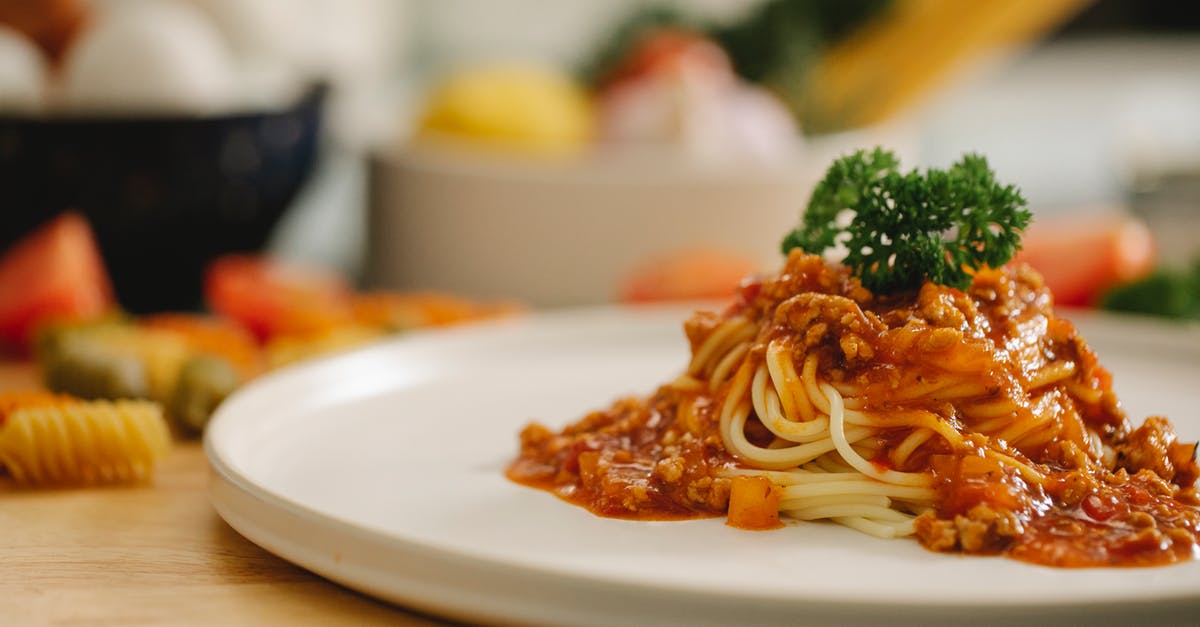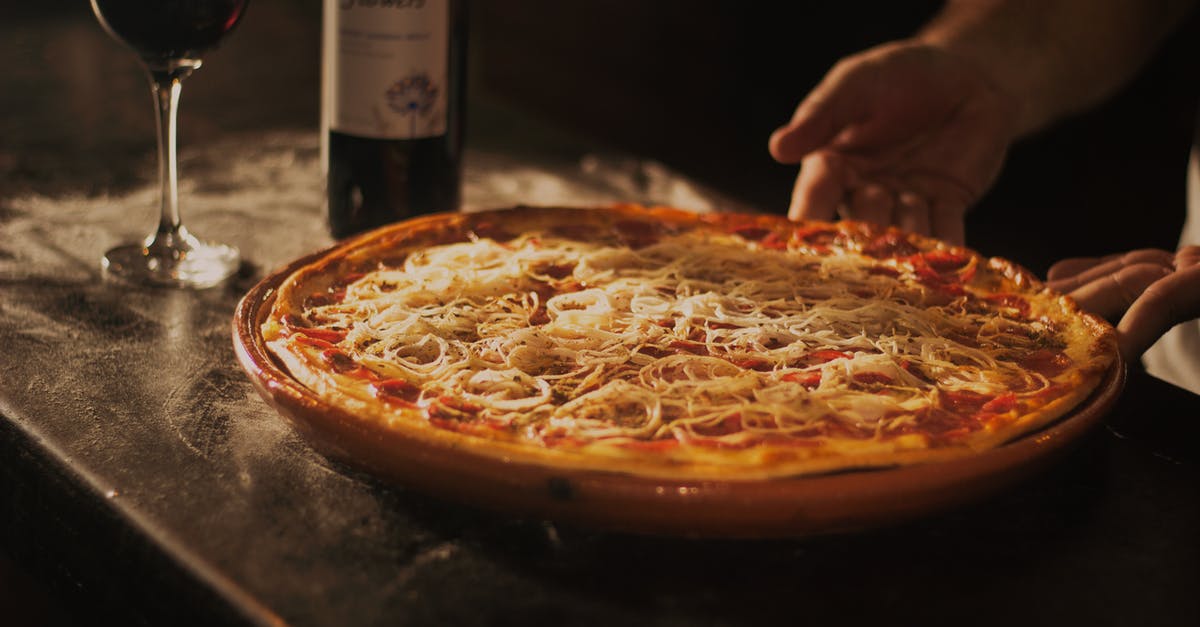Why does tomato sauce spatter more than other sauces?

Of all the (thick) sauces and creams I prepare in a hot pot, tomato sauce is the most jumpy.
When it's hot, it's impossible to cook properly without having it jump everywhere and repaint the walls, and in general the surroundings.
Of course, using a lid helps to solve the problem, but I'm curious:
Why is a hot tomato sauce so prone to jump out of the pot and repaint everything around?
Best Answer
Short answer: tomato sauce is a non-Newtonian fluid. Another interesting link can be found here.
Tomato sauce is an interesting creature. Think about ketchup. You try to shake some out and nothing happens. So you tap the bottle a little bit, still nothing. Tap it a little harder, and a little harder, and suddenly boom: a flood of ketchup. The "jumpiness" of tomato sauce is caused by the same physics.
Basically, tomato sauce has two things in it that contribute to this characteristic: water and tomato pulp. At first, the tomato pulp is just lying around every which way, which makes the sauce act a lot thicker. But when the strands of pulp are aligned, it makes the sauce act a lot more like water. Heating up the sauce increases the pressure on the sauce, allowing areas of the sauce to become much more fluid, resulting in bubbling, popping, and the flinging of tomato sauce all over your clean white shirt. The same effect is what makes ketchup come flying out of the bottle - when you whack it hard enough, the pressure changes the state of the ketchup, and the ketchup literally flows like water.
Edit: updated with relevant information
Unfortunately, when I managed to get a hold of Mr. Steingarten's lovely book, The Man Who Ate Everything,* I discovered that the passage regarding tomato sauce as a non-Newtonian fluid was exclusively regarding ketchup, and not general tomato sauce as I thought I remembered. However, this description is still a valuable one, and it does help explain this particular characteristic of tomato-based sauces (after all, ketchup is a tomato based sauce) [p 96]:
It was only after I had send a stream of ketchup streaking across my wife's favorite tablecloth, a lovely hand-printed Indian cotton from a shop on the rue Jacob, that I telephoned Professor Malcolm Bourne at Cornell for a lesson in non-Newtonian fluids. Sir Isaac Newton wrote the laws governing liquids that flow like water: the more force you exert on them, the faster they flow. But ketchup is different. Composed of tangled red tomato fibers suspended in a sweet and acidic colorless serum, ketchup behaves like a solid both at rest and under low levels of pressure: but then, at some higher threshold, it suddenly begins flowing like an ordinary fluid. That's why the frustrated ketchup lover who loses patience with gentle taps on the bottle's bottom and prematurely shifts to a powerful wallop ends up with a gush of ketchup over everything. Ketchup and mayonnaise are known as Bingham fluids, named after the scientist who characterized them early [last] century.
*Personally, I think that The Man Who Ate Everything is a must-read for anyone interested in culinary science, and a should-read for anyone interested in food.
Second Edit:
Due to a handful of downvotes that I received while I slept last night, I guess some clarification is needed:
- I just want to be absolutely clear here, I am in no way implying that
ketchup == tomato sauce. I offer this information as an example of how tomato pulp suspended in liquid acts. - The fact that "tomato sauce is thick" doesn't really hold up. The question even clearly states: "Of all the sauces and creams I prepare in a hot pot, tomato sauce is the most jumpy", which presumably includes thick ones. If thickness was the only factor (and I'm not saying that it isn't a factor), we would see similar actions from cheese sauces, bechamels, gravies, and a variety of soups. While these sauces/soups do splatter, tomato sauce is significantly more "splattery." Put a pot of tomato sauce next to any other sauce/soup, take your pick, and heat them to the same temperature. I can pretty much guarantee that given similar conditions, you're going to be wiping up a lot more tomato sauce than the other one.
One last edit: This article on Slate indicates that it's a combination of the above (being a "plastic liquid"), the viscosity, and pectin, as pointed out by Brendan in a comment below.
Pictures about "Why does tomato sauce spatter more than other sauces?"



Quick Answer about "Why does tomato sauce spatter more than other sauces?"
Tomato sauce splatters because it has high viscosity.How do you stop tomato sauce from splashing?
The easiest option is to keep the sauce cooking on a lower heat setting. This won't eliminate the splashes, but at least it will reduce their number and frequency. Another option is to stir, which will help push those gas bubbles to the surface faster and minimize the pressure buildup.What causes watery tomato sauce?
Adding too much pasta water to the spaghetti sauce is often the root cause of a watery sauce. Other causes include excess water from the noodles themselves or inadequately cooking down the sauce.What makes tomato sauce different?
Unlike marinara, tomato sauce is thick, rich, complex and not traditionally vegetarian. It's based on the classic French mother sauce, sauce tomat. It starts with salt pork or bacon, onions, carrots and a roux made of flour and butter.How do you keep tomato sauce from separating?
A little tomato paste can help prevent it, but not always. Some cooks actually add a slurry of water and flour (or cornstarch) to the sauce to help thicken the sauce and prevent the effect known as a "watery halo".Spaghetti with tomato sauce: original Tuscan style vs. gourmet with Cristiano Tomei
More answers regarding why does tomato sauce spatter more than other sauces?
Answer 2
This is generally true of thick sauces, particularly ones with low surface tension. When thick sauces boil, there's plenty of resistance to the bubbles rising, so they get bigger before they leave the bottom of the pot. When the bubbles do reach the surface and burst, they're big enough to throw sauce everywhere.
Since there's basically no surface tension (force along the surface, resisting perturbation), the rising bubble just goes straight through and throws stuff everywhere. If on the other hand you were boiling a very thick sugar syrup, you wouldn't get much splatter at all - it sticks to itself, and doesn't let bits fly off when the bubbles break the surface. Other sauces this thick have far more surface tension - for example, a thick gravy or cheese sauce, or even a sugar syrup.
Also, since the sauce is thick, the droplets don't disintegrate as much in the air, and they travel farther, so they less frequently fall back into the pot. It's especially noticeable with something as colored as tomato sauce.
Often it's better to simmer sauces than to boil them anyway, so you can avoid it even without a lid.
Sources: Stack Exchange - This article follows the attribution requirements of Stack Exchange and is licensed under CC BY-SA 3.0.
Images: Malidate Van, Klaus Nielsen, Edward Eyer, ROMAN ODINTSOV
